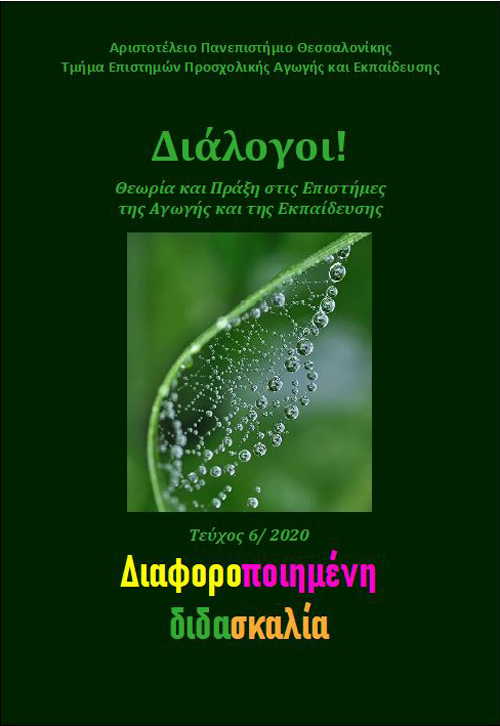Αναθεωρώντας τη διαφοροποιημένη διδασκαλία στο νηπιαγωγείο

Περίληψη
Η θεμελιώδης αποδοχή ότι κάθε παιδί είναι μοναδικό σημαίνει την ύπαρξη ποικίλων διαφορών σε γνωστικό και κοινωνικό επίπεδο μεταξύ των παιδιών. Δεδομένου ότι αυτά τα χαρακτηριστικά επηρεάζουν τη μάθηση, οι εκπαιδευτικοί καλούνται να ανταποκριθούν αποτελεσματικά στην αξιοποίηση αυτής της ετερογένειας. Η Διαφοροποιημένη Διδασκαλία (ΔΔ) θεωρείται μία καινοτόμα διδακτική προσέγγιση, η οποία στοχεύει στη μεγιστοποίηση της μάθησης για το κάθε παιδί, λαμβάνοντας υπόψη τις ανάγκες του κάθε παιδιού στην οικοδόμηση της διδασκαλίας. Παρόλο, που υπάρχουν αρκετές έρευνες που να συνηγορούν στη θετική επίδραση της ΔΔ στα παιδιά, υπάρχει σημαντικό έλλειμα στην εφαρμογή της στο πεδίο της προσχολικής εκπαίδευσης, όπου προωθείται η Διαθεματική προσέγγιση της γνώσης. Για το λόγο αυτό, η παρούσα δημοσίευση συζητά τα αδύναμα σημεία της ΔΔ, στα οποία έχει ασκηθεί έντονη κριτική (π.χ. μαθησιακό προφίλ/μαθησιακό στυλ, ερμηνεία των ενδιαφερόντων), η οποία αναπόφευκτα οδηγεί στην αναθεώρηση και τον εκσυγχρονισμό του πλαισίου της ΔΔ, προκειμένου να αυξηθεί η εφαρμοσιμότητά της στην προσχολική εκπαίδευση. Οι προτάσεις του αναθεωρημένου πλαισίου αφορούν την ένταξη της διαθεματικότητας, την έμφαση στην αυθεντική αξιολόγηση, την τοποθέτηση του μαθησιακού στυλ σε δευτερεύοντα ρόλο, την ερμηνεία των ενδιαφερόντων σύμφωνα με σύγχρονα ερευνητικά πορίσματα. Επίσης, συζητώνται οι εκπαιδευτικές προεκτάσεις, αλλά και η ανάγκη για περαιτέρω έρευνα και εφαρμογή, ώστε να αποδειχθεί η αποτελεσματικότητά του στην προσχολική τάξη.
Λεπτομέρειες άρθρου
- Πώς να δημιουργήσετε Αναφορές
-
Μαβίδου Α. (2020). Αναθεωρώντας τη διαφοροποιημένη διδασκαλία στο νηπιαγωγείο. Διάλογοι! Θεωρία και πράξη στις επιστήμες αγωγής και εκπαίδευσης, 6, 143–158. https://doi.org/10.12681/dial.23528
- Τεύχος
- Τόμ. 6 (2020)
- Ενότητα
- Ειδικό Θέμα

Αυτή η εργασία είναι αδειοδοτημένη υπό το CC Αναφορά Δημιουργού – Μη Εμπορική Χρήση – Παρόμοια Διανομή 4.0.
Οι συγγραφείς των άρθρων που δημοσιεύονται στο Διάλογοι! Θεωρία και Πράξη στις Επιστήμες Αγωγής και Εκπαίδευσης διατηρούν τα δικαιώματα πνευματικής ιδιοκτησίας επί των άρθρων τους, δίνοντας στο περιοδικό το δικαίωμα της πρώτης δημοσίευσης. Άρθρα που δημοσιεύονται στο Διάλογοι! Θεωρία και Πράξη στις Επιστήμες της Αγωγής και Εκπαίδευσης διατίθενται με άδεια Creative Commons 4.0 και σύμφωνα με την άδεια μπορούν να χρησιμοποιούνται ελεύθερα, με αναφορά στον/στη συγγραφέα και στην πρώτη δημοσίευση για μη κερδοσκοπικούς σκοπούς και με δικαίωμα τροποποίησης μόνον με παρόμοια διανομή (αν αναμείξετε, τροποποιήσετε, ή δημιουργήσετε πάνω στο υλικό, πρέπει να διανείμετε τις δικές σας συνεισφορές υπό την ίδια άδεια όπως και το πρωτότυπο).
To Τμήμα Επιστημών Προσχολικής Αγωγής και Εκπαίδευσης του Αριστοτέλειου Πανεπιστημίου Θεσσαλονίκης και το Εθνικό Κέντρο Τεκμηρίωσης διατηρούν το δικαίωμα να δημοσιεύουν, να αναπαραγάγουν, να παρουσιάζουν στο κοινό, να διανέμουν και να χρησιμοποιούν άρθρα που δημοσιεύονται στο Διάλογοι! Θεωρία και Πράξη στις Επιστήμες Αγωγής και Εκπαίδευσης σε οποιοδήποτε μέσο και μορφή είτε μεμονωμένα είτε ως μέρη συλλογικών έργων, για όλο το χρόνο διάρκειας προστασίας της πνευματικής ιδιοκτησίας και για όλες τις χώρες του κόσμου.
Αυτό περιλαμβάνει ενδεικτικά, και όχι αποκλειστικά, το δικαίωμα δημοσίευσης των άρθρων σε τεύχη του περιοδικού Διάλογοι! Θεωρία και Πράξη στις Επιστήμες Αγωγής και Εκπαίδευσης, αναπαραγωγής και διανομής μεμονωμένων αντιγράφων των άρθρων, αναπαραγωγής ολόκληρων των άρθρων σε άλλη έκδοση του Τμήματος Επιστημών Προσχολικής Αγωγής και Εκπαίδευσης του Αριστοτέλειου Πανεπιστημίου Θεσσαλονίκης και του Εθνικού Κέντρου Τεκμηρίωσης και αναπαραγωγής και διανομής των άρθρων ή περίληψης αυτών με χρήση πληροφορικού συστήματος αποθετηρίου.


